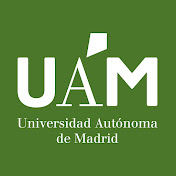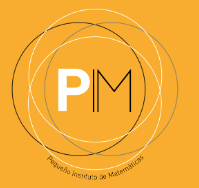Investigación
Noticias Destacadas
 Agenda del Departamento Agenda del Departamento |
- Información (provisional) sobre grupos y horarios de las asignaturas impartidas por el Departamento de Matemáticas, para el curso 2023-2024.
- Propuestas de Trabajos de Fin de Grado para el curso 2023-2024.
|
Canal @matematicasuamEnlace al canal del Departamento en youtube. |
PIM (Pequeño Instituto de Matemáticas)Con el objetivo de fomentar el interés por las matemáticas y dirigido a jóvenes entre 14 y 18 años, nace este proyecto de Instituto de Ciencias Matemáticas (ICMAT) en colaboración con nuestro Departamento, la Universidad Autónoma de Madrid y la Real Sociedad Matemática Española. El proyecto comienzó en el curso académico 2022-2023. Ampliar información en su página web. |
Lectura de tesis
Título: Sylvester rank functions, epic division rings, and the strong Atiyah conjecture for locally indicable groups
Doctorando: Diego López Álvarez (ICMAT-CSIC)
Director: Andrei Jaikin Zapirain
Fecha: Jueves, 4 de marzo
Hora: 15:00
Modalidad: Semi-presencial
Si alguien quiere unirse mediante enlace, usar preferiblemente Google Chrome.
Lugar:
* Físico: Sala de Grados, Módulo 8, Facultad de Ciencias (Aforo máximo 21 personas)
* Virtual: Equipo de Teams "Defensa de tesis de Diego López Álvarez". He añadido a todo el departamento ya, pero si alguien no es miembro del equipo y quiere asistir, puede:
- Solicitar invitación para el equipo, contactando a mi correo del icmat diego.lopez[at]icmat[dot]es
- Si sólo quiere asistir a la charla, puede hacerlo el día de la defensa mediante el enlace https://teams.microsoft.com/l/meetup-join/19%3a61fff4e982f94baab78cc6f4e2a0f56b%40thread.tacv2/1614004668727?context=%7b%22Tid%22%3a%22fc6602ef-8e88-4f1d-a206-e14a3bc19af2%22%2c%22Oid%22%3a%22c381d7a8-fad7-481f-9727-4f14981ba236%22%7d
Por favor, si se quiere solicitar invitación al equipo, se ruega avisar con antelación de uno o dos días. Si surge cualquier incidencia el día de la defensa (por ejemplo, con el enlace), por favor contactar con Andrei en su correo institucional andrei.jaikin[at]uam[dot]es
Abstract:
Throughout the thesis we consider questions related to embeddings of noncommutative domains into division rings.
On the one hand, we treat the problem of existence of such embeddings for group rings K[G] where K is a subfield of the field of complex numbers and G is a locally indicable group (for instance, a torsion-free one-relator group). These groups comprise a subfamily of left orderable groups, and hence this is a particular instance of the Malcev embedding problem.
In this sense, the strong Atiyah conjecture for these group rings, principal and original motivation to the thesis, proposes a candidate to be a division ring in which K[G] embeds, namely, the division closure of K[G] inside the classical quotient ring U(G) of the group von Neumann algebra N(G). In the main result (joint with A. Jaikin-Zapirain) we prove that the strong Atiyah conjecture holds in this setting and that, moreover, the resulting division ring can be uniquely identified through a universal property. The associated methods and results allow us to prove a posteriori other related conjectures, such as a version of Lück's approximation conjecture for virtually locally indicable groups.
On the other hand, we deal with the notion of universality of a division ring. For a ring R, a universal division ring of fractions is a division ring that contains and is generated by R as a division ring, and in which we can invert "the most" matrices possible over R. In this regard, (pseudo)-Sylvester domains are rings R admitting a universal division ring of fractions in which every matrix becomes invertible unless there is an "obvious" obstruction.
In a joint work with F. Henneke, we prove that crossed products of the form E*G, where E is a division ring and G is free-by-{infinite cyclic}, are always pseudo-Sylvester domains, and we explore the more general situation of crossed products F*Z of a fir F and the ring of integers Z.
Along the thesis, the theory of Sylvester rank functions provides a unifying language and a tool to address the problems considered. We further analyze the space of Sylvester rank functions that can be defined on certain families of rings, including Dedekind domains and a subfamily of skew Laurent polynomial rings with coefficients in a division ring (joint with A. Jaikin-Zapirain).






